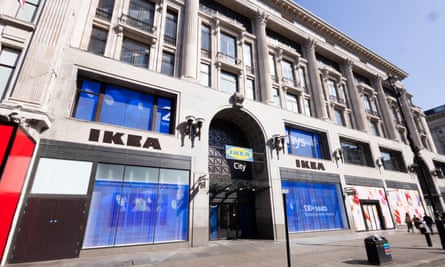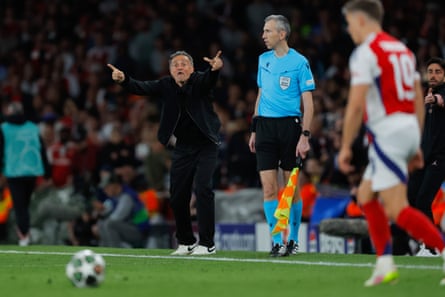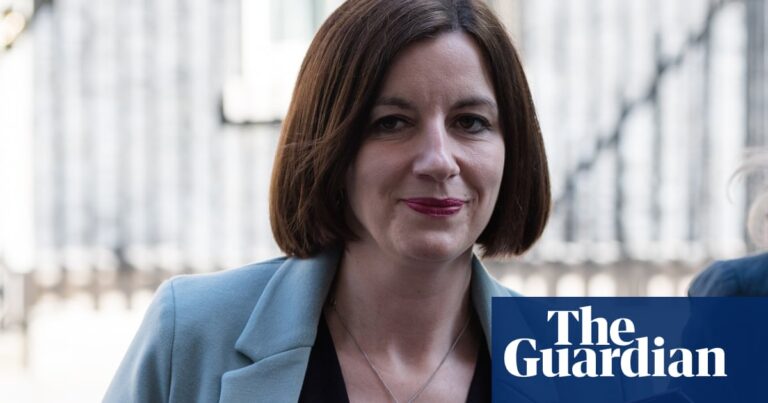Mark Carney has used his victory speech to claim Donald Trump wanted to “break us” as he led Canada’s Liberal party to a fourth term in office, in a race that was upended by threats and aggression from the US president.
The Liberal triumph capped a miraculous political resurrection and marked a landmark victory for Carney, the former central banker and political novice who only recently succeeded Justin Trudeau as prime minister. Results on Tuesday confirmed that the Liberals fell just short of a majority government and would therefore need the support of political rivals to govern.
Mirroring a theme of the campaign, Carney told election-night supporters that Trump wanted to “break us, so that America can own us”, adding: “That will never, ever happen,” to shouts from the crowd.
He also gave a stark assessment of a world order once defined by an integrated global trading system with the US at the centre, saying such a system was over, and he pledged to reshape Canada’s relationships with other nations.
“We are over the shock over American betrayal. But we will never forget the lessons,” he said.
Later on Tuesday, the two leaders struck a more conciliatory tone and agreed to meet “in the near future”, according to Carney’s office, which said Trump had congratulated the prime minister for his victory. “The leaders agreed on the importance of Canada and the United States working together – as independent, sovereign nations – for their mutual betterment,” it said.
In a shock result, the Conservative leader, Pierre Poilievre, lost the seat he has held since 2004, even as his party performed better than had previously been expected. The Tory leader pledged to keep his job during his election night speech, but the loss is expected to inflame tensions within the party.
“While we will do our constitutional duty of holding the government to account and proposing better alternatives, we will always put Canada first as we stare down tariffs and other irresponsible threats from President Trump,” Poilievre told supporters.
“Conservatives have been leading the debate and we will continue to put forward the best arguments to improve the lives of our people right across this country.”
Jagmeet Singh, leader of the progressive New Democratic party leader, also lost his seat in a national vote that saw the NDP have their worst-ever result, losing party status and most of their seats. In an emotional speech Singh announced he would resign as leader.
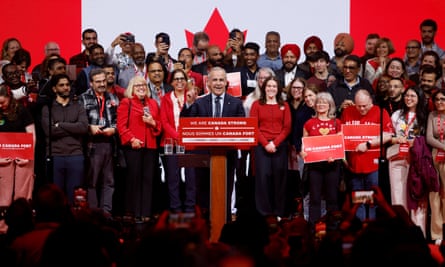
Carney praised other party leaders for campaigns that he said had strengthened the country’s democracy. “Let’s put an end to the division and anger of the past. We are all Canadian and my government will work for and with everyone.”
After a narrow victory in the previous federal election, the Liberals relied on the leftwing New Democratic party to help it pass legislation. Monday’s vote appeared likely to produce a similar result, with the Liberals and the NDP together holding enough seats to pass legislation.
For the Liberals, the win marks a remarkable recovery for a party that was, until recently, on track for electoral devastation. Carney’s predecessor as leader, Justin Trudeau, served as prime minister for nearly 10 years but the twilight of his leadership was marked by repeated threats of mutiny, bitter feuding and a fed-up electorate.
Until the end of 2024, internal discussions within the Liberal party were grim: under their most optimistic scenarios, they could only hope of holding the Conservatives to a minority government. Outright victory was nowhere on the party’s radar.
“We were dead and buried in December. Now we are going to form a government,” David Lametti, a former Liberal justice minister, told CTV late on Monday. “We have turned this around thanks to Mark.”
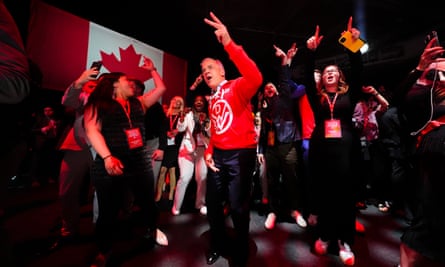
Trump’s threats to annex the country to make it the 51st state, his belittling of Trudeau as “governor” and threats of economic coercion have all contributed to a sharp feeling of anger and betrayal towards Canada’s southern neighbour.
“The shift in polls was absolutely without precedent,” said David Coletto, the head of the polling firm Abacus. “But to see the honeymoon that followed – and the way that support held, is also unprecedented. I can’t think of other jurisdictions around the world where we’ve seen this complete reset. And this turns on two factors: how unpopular Justin Trudeau was, and how much of a threat and gamechanger Donald Trump has meant to Canada.”
For the Conservatives, defeat marks a disappointing end to an election campaign the party had been demanding for months. Under the leadership of Poilievre, the Tories had for the past two years seemed all but certain to form a government.
But within weeks of Trump’s threats and the emergence of Carney as the new Liberal leader, their 25-point poll lead evaporated.
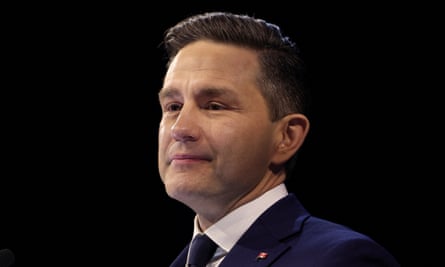
To have come inches from victory and then to lose is likely to kick off a sombre postmortem for the party – and internal feuding over the future of the Conservative movement.
For Carney, who served as prime minister for only nine days before calling a snap election, the gambit was one in which he hoped to make history for the party. But also on the line for Carney was the prospect of making history for an entirely different reason: had he lost, he would have inherited the mantle of Canada’s shortest-serving prime minister.
Ian Laroque, a campaign volunteer who lives in Carney’s Ottawa electoral district, said: “I saw how Carney conducted himself and I felt like he was really a man who met the moment. He wasn’t a polished politician. But he’s the kind of person we need to lead the country right now. It’s not every day you get an economist during an economic crisis.”
Monday’s vote was unusual in other ways, too: for the first time in nearly 70 years, the two main parties were set to take more than 80% of the vote between them, reflecting the collapse of other smaller opposition parties including the NDP and the separatist Bloc Québécois.
In an emotive speech to supporters, Jagmeet Singh announced he would step down as leader of the NDP after failing to win his seat. In its worst-ever performance, the progressive party failed to meet the 12-seat threshold needed to retain official party status – the second time in its history it has been unable to do so.
The loss of party status means the NDP loses certain parliamentary privileges, including the ability to ask questions during question period as often as recognized parties. These rules can be amended at the discretion of the speaker, however. The NDP will also lose out on money allocated to parties for research purposes, which is distributed proportionally to the number of seats held by a recognized party.
Source: theguardian.com










